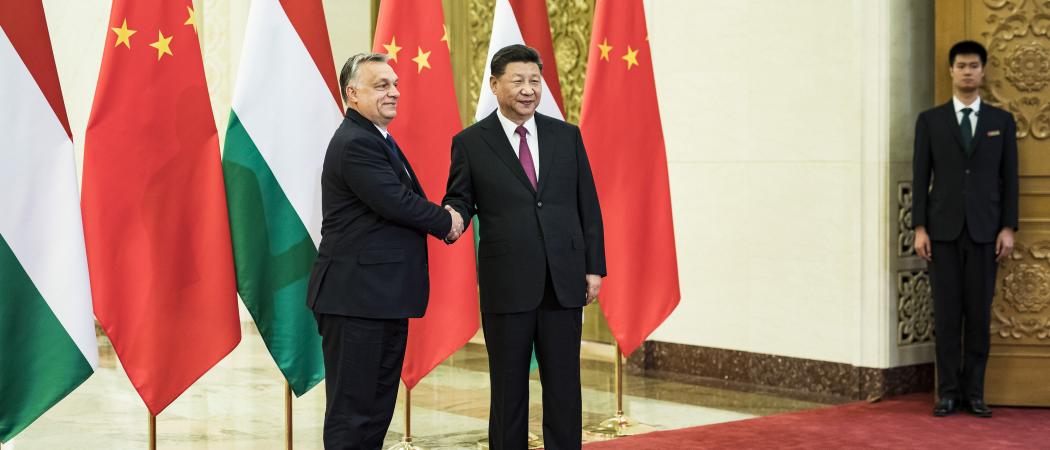The new campus in Budapest is yet another sign of China’s intent on strengthening its science and technology foothold in central and eastern Europe.

Hungarian prime minister Viktor Orbán with Chinese president Xi Jinping during an official visit in Beijing last year. Photo: MTI/Balázs Szecsõdi
Budapest is to host the first foreign campus of a Chinese university in eastern Europe after Hungarian innovation minister László Palkovics signed a memorandum of understanding with Xu Ningsheng, president of Shanghai-based Fudan University.
The agreement signed in December, marks the establishment of yet another Chinese foothold in science and technology in central and eastern Europe, and also points to increasing politicisation of higher education and research in Hungary.
The Hungarian government cites the “outstanding research record” of Fudan, saying the new campus will “enhance” the educational standards of Hungarian universities, teaching internationally competitive knowledge and skills that are vital for Hungary’s economy.
The plan to establish the campus has raised eyebrows among academics who were directly affected recently when the Hungarian government limited academic freedom at Central European University (CEU) and the Hungarian Academy of Sciences.
After an amendment to Hungary’s higher education law was passed in 2017 requiring foreign universities to maintain a campus in their home country, CEU was forced to retreat from its Budapest base. In November it officially opened a campus in Vienna, from where it now offers more than 80 per cent of its courses.
The legislation was widely interpreted as a direct move against CEU, an institution founded by Hungarian-born philanthropist George Soros, a foe of prime minister Viktor Orban and his self-styled ‘illiberal democracy’.
Another piece of legislation passed in 2019 stripped the Academy of Sciences of its research institutes, reorganising them in a new institution under the direct control of the government.
Zsolt Enyedi, pro-rector for Hungarian affairs at CEU, told Science|Business that CEU welcomes other international universities to Hungary and “wishes the best to Fudan”. However, Enyedi believes the Fudan campus is yet another example of prime minister Viktor Orbán using universities for political gain. That is a habit which is now, “a simple tool in Orbán’s illiberal toolkit,” he said. “It is concerning that the appearance and expulsion of foreign universities became so politicised. Universities are not supposed to play such a role.”
András Báldi, a researcher at the Centre for Ecological Research of the Hungarian Academy of Sciences said, “There are [foreign] universities which are supported by the government. Not all, however.”
A spokesman for the Hungarian government said the Chinese government sees the new campus in Hungary as, “a priority project of bilateral cooperation.”
“The initiative is equally in line with the policy of easterly opening, the Chinese Belt and Road Initiative, and the goals of the cultural, scientific and educational treaty between the two countries which was renewed last November,” the spokesman said.
Fudan University is ranked 40th in the QS World University Ranking and has more than 4,500 lecturers who teach some 30,000 students, but it has been recently criticised for stripping “freedom of thought” from its charter and adding a pledge to follow the leadership of the Communist party.
The university has not answered to a request for comment.
A string of deals in the region
The planned Budapest campus of Fudan University is not the only move by the Chinese government to strengthen research cooperation with Hungary and other countries in central and eastern Europe.
In 2019, Zoltán Birkner, president of the Hungarian national research, development and innovation office (NRDI) went to Beijing to present the results of a bilateral science and technology project at the “Belt and Road” forum for international cooperation.
According to Birkner, about 100 applications were selected for funding in joint Hungarian-Chinese science and technology calls and an additional 10 large-scale joint industrial research and development projects have been launched in antibiotics, Alzheimer’s disease, graphene and food safety.
Hungary is also working with China on a joint technology transfer centre in Chongqing, covering renewable energy, smart cities and wastewater management.
During talks with Birkner, the Chinese deputy minister for science and technology Zhang Jianguo announced China is considering boosting cooperation at the ELI-ALPS laser facility in Hungary’s third largest city, Szeged, a sister research centre of the ELI-NP in Bucharest, the world’s most powerful laser research infrastructure.
Strategic agriculture research in Romania
Last year, Romania’s former research minister Nicolae Hurduc opened the China-Romania science and technology park, a joint research centre run by the University of Agronomy Sciences and Veterinary Medicine in Bucharest and the Chinese Academy of Agriculture Sciences in Beijing.
The minister praised the science collaboration between Romania and China, calling it “strategic” and announced plans for a renewed cooperation agreement. “We need China’s friendship, just as we think China also needs a reliable partner in Eastern Europe,” Hurduc said. Since then, the government has fallen and Hurduc is no longer a minister. It is unclear what stage the negotiations have reached.
Romania is also working on a pilot call for two-year research projects of high impact on scientific and technological progress and economic development in both countries.
The Bulgarian connection
In December, the president of the Bulgarian Academy of Sciences Julian Revalski met the ambassador Dong Xiaojun to talk about ways of strengthening scientific cooperation between the two countries and introducing a new joint exchange programme for young scientists and PhD students. A deepening of relations would be “extremely beneficial,” Revalski said.
In 2018, the economic research institute at the academy signed a cooperation agreement with the institute for development studies at Fudan University.
Poland is also planning to expand a joint research funding scheme it has with the natural science foundation in China supporting research projects in natural and life sciences but also in engineering.
This year, Slovakia will host the fifth “China-CEEC Conference on Innovation Cooperation”, a meeting of 16 countries in central and eastern Europe and China aimed at establishing new ways of exchanging scientific and technological innovation resources and working together on transferring research results to the industry.
In 2019, prime ministers of the 16 countries signed a list of guidelines on cooperation with China, including an agreement to “encourage innovation-driven mutual investments” in science and technology.





 A unique international forum for public research organisations and companies to connect their external engagement with strategic interests around their R&D system.
A unique international forum for public research organisations and companies to connect their external engagement with strategic interests around their R&D system.